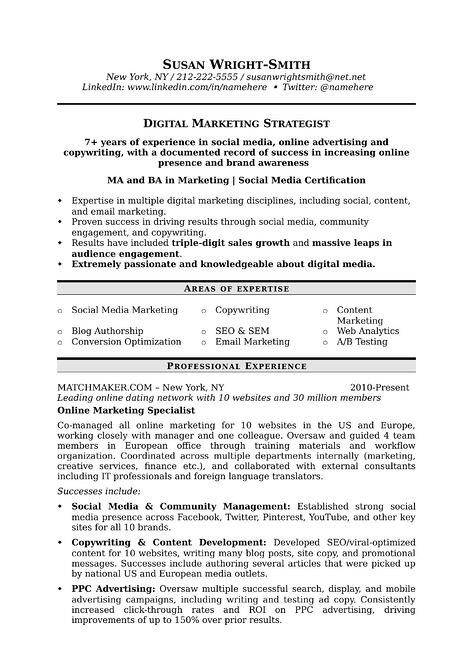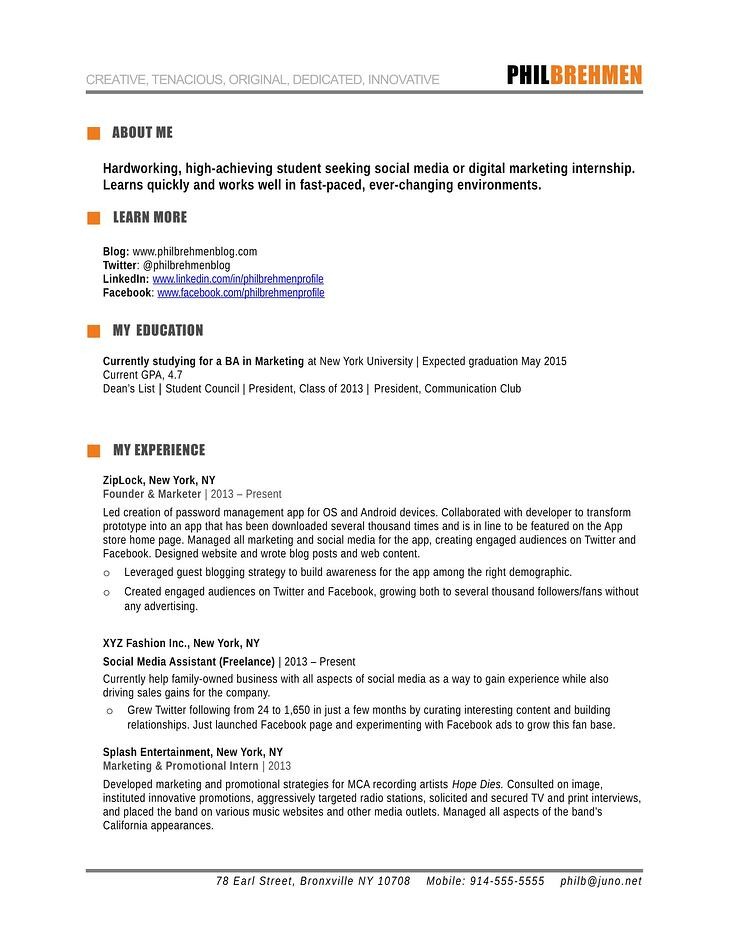Contents of a Great Marketing Resume
A great marketing resume should be well written and formatted, one page in length, define your unique value proposition and contain details of your employment and education. Depending on the company and the job, you can also add an interests and hobbies section to your marketing resume.
It's ironic, but despite knowing how to sell products and services, so many marketers have a hard time selling themselves. It can often be difficult to turn the spotlight inward, but creating a standout resume is a skill all marketers need to perfect if they want to grow their career.
How to Write a Marketing Resume
If you're a marketer whose resume could use a little polish, don't worry. With just a few resources and some actionable tips from hiring managers themselves, we'll help you create a truly impressive marketing resume that's sure to stand out to recruiters.
These free resume templates feature sample copy for 10 of the most popular marketing positions. Take a look at them, and then use the advice below to customize your resume and make it rise above the rest in the stack.
1. Know your target audience.
You never start a marketing campaign without knowing who you want to reach. That’s because once you know your target audience, it's easier for the other decisions to fall into place.
The same logic applies to your resume. If you know who will read it and what's important to them, you can shape your message accordingly. To do this, you need to think about the type of job and company you're hoping to work for.
Ask yourself questions like:
- Is the job purely in inbound marketing, or will it require both traditional and digital work?
- Will you be a specialist or a generalist?
- Who is the employer -- an agency with a buzzing digital marketing team in place already, or a small company looking to leverage the power of social media to grow their sales? Or maybe it's a marketing department within a large and established corporation?
Once you've outlined what's most important to the company and job you're applying for, you can carefully target your resume to them. You'll know what skills or traits to highlight, what keywords to use, and which parts of your background will be most interesting to the hiring manager. (For clues about which skills different marketing roles typically require, read this blog post on marketing job descriptions. You can borrow phrasing from those for your own resume.)
2. Define your unique value proposition.
You have a unique blend of skills, characteristics, and experiences that make you different from every marketer. To create a truly effective resume, you need to define exactly what this unique blend is -- we'll call this your value proposition.
To develop your own value proposition, think about what separates you from other marketers. Is it your in-depth knowledge of marketing analytics? Your ability to write irresistible headlines? Perhaps it's your talent for creating compelling videos? Or maybe you have an impressive record of using social media to drive sales growth? Whatever it is, you can use it to set your resume apart from the crowd.
To a large extent, your value proposition depends on the type of positions and companies you're targeting. Large and small companies often look for completely different skill sets, as do companies in different industries. So as you think about what makes you uniquely valuable, and how that aligns with the jobs you're applying to.
3. Determine your messaging strategy.
It’s crucial to determine your messaging strategy -- before you write a single word of your resume. That's what you do when you're running a marketing campaign, isn't it? Here are some of the things to think about:
- What is the best structure for your resume in order to highlight your value proposition?
- Which keywords will your ideal employer be looking for?
- How can you give real world examples of your value proposition in action? (Think about campaigns you've run, social media successes, ideas you developed, etc.)
- What is the best layout and design to reinforce your message?
All these decisions should be made before you start writing, and they should all be made with your target audience in mind. That way you can be sure that when potential employers read your resume, it will immediately strike a chord.
If you want an example of great messaging in a resume, check out the digital marketing executive resume sample among our free downloadable resume templates. Look at the progression of roles and key accomplishments in those roles -- it tells his career story while also making him look exceptionally qualified.
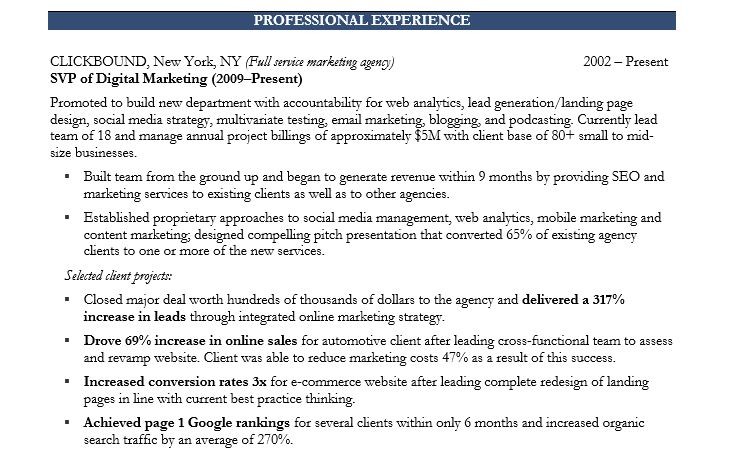
4. Make sure your resume gets seen.
If you don't already have a connection at the company you're applying to, you'll most likely need to apply through a computer system. This process is what makes it so critical to upload it in a format that allows all recipients to read it as intended, like a PDF. That way, none of the original formatting or spacing is lost in translation, making it really yucky to read from a recruiter's perspective. Although they'll still have access to your resume, confusing formatting might distract them from the content.
Many common applications have similar save or export options that let you ultimately save as a PDF. The most common are Microsoft Word and iWork Pages:
- Microsoft Word: Choose File > Save as Adobe PDF
- iWork Pages: Choose File > Export to > PDF
Once you send in your resume, the computer service will do is scan it for relevant keywords that have been programmed in advance by the recruiter. Then, the system will either "pass" or "fail" you, depending on how many keywords and phrases are included in your resume that match what the recruiter's looking for.
Don't worry: Even if you "fail," it doesn't mean your resume won't ever get seen by a real human. But it doesn't look great, either -- so try to foresee which keywords the recruiter will be looking for by making a note of all of the skills you have that are relevant to the job description.
Keywords to include might be the names of the social media sites you use, analytics or CRM systems you know, and software programs or SAAS systems you’re familiar with. Make sure you've included these terms as seamlessly as possible throughout your resume (where relevant), and add any outliers at the very bottom under a "Technical Skills" or "Digital Marketing Skills" section.
9 Things Hiring Managers Are Looking For in Your Marketing Resume
Sure, computers may be used in the initial screening process, but it's humans -- with real feelings, pet peeves, hobbies, relationships, experiences, and backgrounds -- who are ultimately reading and evaluating our resumes.
They're also the ones who get annoyed when we don't put our employment record in chronological order; who just don't feel like reading paragraph-long job descriptions; and who get excited when you went to the same college as them. So to get a sense of what really matters on a marketing resume, I asked some hiring experts what they actually care about when they scan resumes, and here's the inside scoop on the tips they shared with me. (By the way, don't miss out on what they said about cover letters at the end.)
- Length
- Formatting
- Writing Quality
- Location
- College/Graduate School and Major/Concentration
- Companies and Titles
- Top Few Bullet Points in Each Section
- Dates of Employment
- Interests and Hobbies
1. Length
Limit your resumes to one page if you can. It takes hiring managers six seconds to decide whether they like your resume or not. If they do, they'll keep reading. If they don't... well, it's on to the next. So, chances are, they won't even get to page two.
In some cases, bleeding onto another page is OK, especially if you have a lot of really relevant experience. But if you have to do that, just don't exceed two pages. Remember, recruiters can always look at your LinkedIn profile for the full story. (Because you've completed your profile on LinkedIn, right?)
2. Formatting
Formatting speaks to the way candidates collect their thoughts and organize their ideas. As HubSpot's VP of Sales Productivity and Enablement Andrew Quinn explains it, "A candidate's resume is their ad to me. How are they structuring this ad so I get a clear picture of what they're capable of?"
There's a fine line, though, warns Marketing Team Operations & Strategy Manager Emily MacIntyre. "If you stray too far from normal formatting, it's hard to read and understand your resume. Don't get so creative that your resume becomes difficult to digest."
Below is a snippet from a 2-page resume with great formatting that's easy to read. If you like the format and want to use it as your own, you can find it among our free downloadable resume templates here under "Digital Marketing Strategist."
Here's another one, this time a one-page resume from a student seeking an internship. If you like the format and want to use it as your own, you can find it among our free downloadable resume templates here under "Inbound Marketing Intern."
To explore other resume formats, download our free resume templates.
The creatives among you might be asking, "What about infographic resumes?" Here's the general consensus: Don't make an infographic resume. Every hiring manager I spoke with advised sticking to the classic resume form instead of infographics or other formats.
"Infographic resumes are impossible to understand," says MacIntyre. "We appreciate creativity, except when it’s overkill and hard to follow. Keep it simple. Everyone appreciates a simple resume. If you're a designer, showcase your creativity with a cool portfolio website in addition to your simple resume."
Below is an example of a creative format that's still easy to read and understand. It was made using the Apple desktop app iWork Pages, which can be exported as a PDF so none of that beautiful formatting gets messed up in translation.
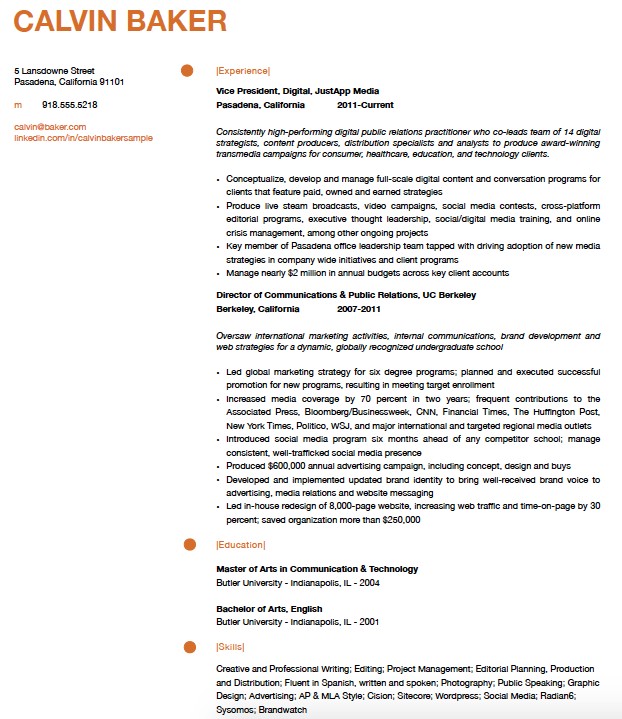
3. Writing Quality
Hiring managers throw away resumes with spelling errors -- but writing quality goes beyond just simple spelling mistakes. Writing and presenting data in meaningful ways is a critical skill for any position, from blogging to engineering.
Are the details you want hiring managers to know about you easy to consume? Do you use concise sentences to convey your performance and accomplishments? Are your verb tenses consistent (except for current positions)? Is your language overflowing with buzzwords, or does it sound natural? Are you making sure to use first-person without using "I" or "my"? (See #11 in this blog post to understand why that's not okay.)
"Formatting, spelling, syntax, and structure are all evidence of attention to detail," Quinn told me. "This is important for any job, but especially if you're applying to a job where attention to detail matters." If you're applying for a writing position, this is even more important.
4. Location
Hiring managers want to know if you'll need to relocate. If you already live near the company's office, great! If you would need to relocate, then it gets a little more complicated. Technically, hiring managers can't legally ask you directly where you live -- but omitting location will raise eyebrows. Even P.O. boxes are a little iffy.
If you do need to relocate, you should still include your current, out-of-town address on your resume, but be prepared to answer relocation status questions in an interview. If the company doesn't offer relocation packages, will you be able to afford taking the job and moving anyway? If not, you may be wasting time.
5. College/Graduate School and Major/Concentration
Which is more important: Where you went to school, or what you studied?
It depends on the job you’re applying for. In most cases, your degree should make sense for the role. Hiring managers are looking for the tie-in; what's relevant about what a candidate's done in school. That doesn't mean only marketing majors can apply to marketing jobs -- marketing teams might hire someone who came out of creative studies like liberal arts, graphic design, or writing. An engineering team, on the other hand, probably won't hire someone without a computer science degree.
It also depends on how successful you were at the school you attended. While there are some hiring managers who only give interviews to graduates of top-tier schools, most say it helps to go to a top-tier school, but it's certainly not a deal-breaker if you went to a lower-tier school or community college. A community college graduate with a 4.0 GPA could be more attractive than an Ivy League graduate with a 2.0.
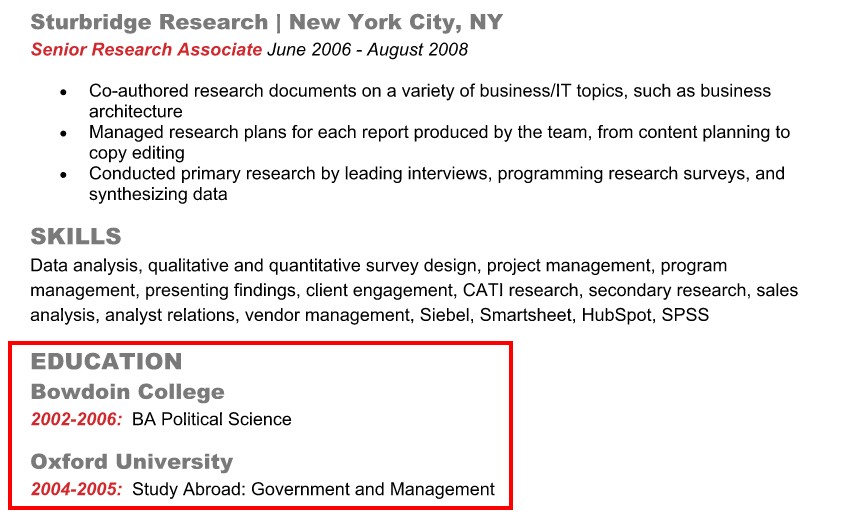
Speaking of GPA -- when to take it off your resume is subjective. If your GPA was below a 3.0, consider removing it altogether. If it's higher than that, Quinn says, “The benchmark is five to seven years after graduation, which is when candidates tend have a solid track record of employment. If you did well in school but had lackluster job prospects following graduation because of, say, a bad economy, you could definitely leave it on longer.”
It goes both ways, he explained: "If you had great jobs and accomplishments following graduation but didn’t have a good GPA, consider removing your GPA earlier."
Three to five years after college or graduate school graduation, you can move your "Education" section to the bottom of your resume -- unless you connected with someone through an alumni network or if you know an executive there also went to your school.
Want to take your marketing education to the next level and make your resume even more appealing to potential employers? Become a certified inbound marketing professional with HubSpot's free marketing certification.
6. Companies and Titles
Hiring managers will look at where you've worked before (do they recognize the company names or know anyone who works there?) and your titles at those companies.
"If you're applying for a sales position at a software company like HubSpot, we're looking for experience selling software," David Fernandez, former Recruiting Team Lead at HubSpot, told me. "If you're applying for a services position, we're looking for customer-facing experience."
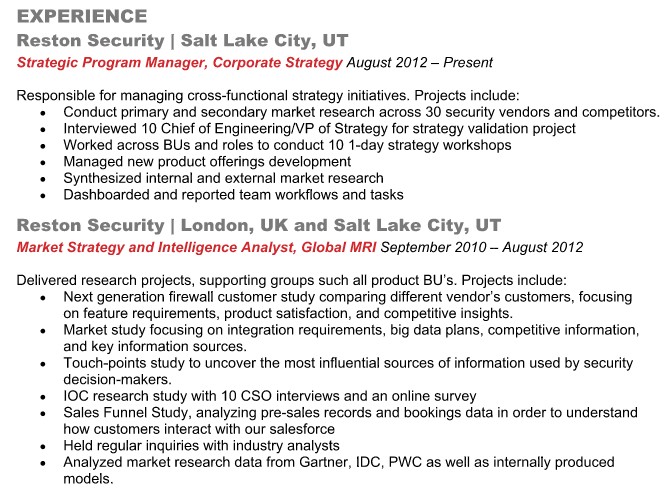
Yes, people tweak their titles at previous companies to more closely match the positions they're applying for. If you do this, your "new" title should be close enough to what you really did that if someone were to call and check a reference, they wouldn't be dumbfounded. Maybe "Clerk to the Surgical Waiting Room" becomes "Customer Service Clerk." Also, make sure to change your titles on LinkedIn, too -- hiring managers will check for consistency on LinkedIn, Fernandez said.
7. Top Few Bullet Points in Each Section
Each position you've had should be accompanied by no more than five to six bullet points. Remember, these hiring managers are scanning your resumes really quickly, so you want to make it easy for them to find and digest the relevant information by consolidating the most important points and putting them first. Paragraphs are a big no-no.
Luckily, you work in a profession where everything can be measured and analyzed, which means it's relatively easy to tell an impressive story of success. Think about all the ways your work can be quantified through hard data and then fill your resume with action-packed bullet points that convey the value you've added.
Focus on accomplishments first before responsibilities and duties. If you had a senior management role, include the number of people you managed. If you built a program from the ground up, call that out.
Also, include goals and metrics that hiring managers can use to compare you against other candidates, and make sure those metrics make sense so you don't confuse the hiring manager. Run the metrics by your mom. I'm serious. If they make sense to her, then they're all set. If not, then you weren't clear enough and you need to tweak the language.
Examples might be increasing social media engagement, improving SEO ROI, driving increased web traffic, reducing bounce rates, boosting landing page conversions, etc. Once you have a list of your results, choose the best four or five and turn these into bullet points like these:
- Drove 37% improvement in newsletter clickthrough rates by rewriting sales copy.
- Grew ecommerce sales 23% in just 6 months by redesigning and A/B testing all landing pages.
Here's a more detailed example:
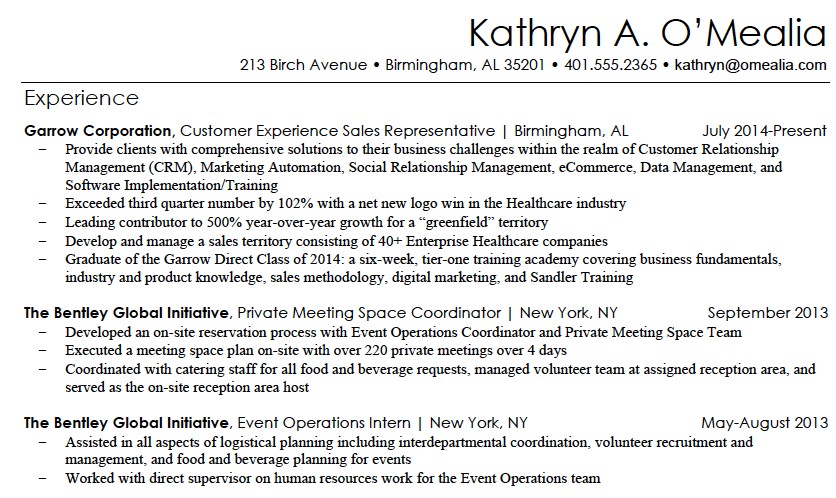
If you want more examples of actionable data points, download these free resume templates.
8. Dates of Employment
Hiring managers look for job hopping and large gaps in employment, which are both red flags. Job hopping is a sign of failure to commit, a quality no one wants at their company. A word of advice: You should try to stay at every job for at least a year, preferably two or more years. Otherwise, it's a red flag.
And if you took longer than six months off of work, MacIntyre suggests you explain the gap on your resume. If it's something like teaching or the Peace Corps that you can describe like a job, then you can insert it into your resume just as you would any other position:
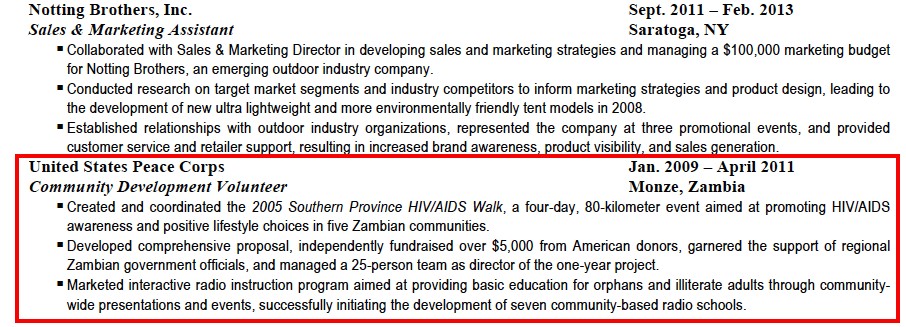
If it's something like traveling abroad or taking time off for family or personal reasons, you can simply add it in italics of parenthesis. "Travelled abroad." "Took time off for family." "Took time off for personal reasons." Hiring managers just want to see a rational explanation -- that you were doing something productive with your time.
9. Interests and Hobbies
Whether you include interests and hobbies on your resume depends on the company and the job. If you're applying for a creative role, hobbies like photography and painting could be interesting to an employer. If you're hiring for an accounting role, then a hobby like skydiving wouldn't be good to include -- hiring managers might categorize you as a risk-taker, and do they really want a risk-taker managing their money?
"Think about the conclusions someone could draw from your hobbies relative to the role you're hiring for," Quinn advises. "Do they enhance or detract from the image you're trying to convey? If you know the culture embraces unique individuals that have a broad background and set of interests, then it could be useful information. But conservative organizations probably don't care what you do in your free time -- in fact, they could interpret outside hobbies as distractions."
Companies with cultures like HubSpot's want their employees to have some personality and invest in outside interests. So if you're applying to join that kind of culture, an "Interests" or "Hobbies" section could benefit you. "They're great conversation starters," says MacIntyre. "'You’re a skier? Me too! Which mountain do you go to?' It creates common ground for conversation and helps us assess culture fit."
Before including or omitting this section on your resume, gain some intelligence about the company’s environment and culture. (And check out HubSpot's culture code if you haven't already.)
Spend Less Time on These...
Personal Statements/Objectives
In fact, we recommend skipping these altogether. Frankly, they're irrelevant -- not to mention way too easy to screw up. I've spoken with HubSpot recruiters about numerous times where candidates put the name of another local company on there -- huge mistake.
Instead, replace it with a "Skills" or "Key Skills" section at the top of your resume, in column format, that highlights the top six to nine skills applicable to the role you’re applying for. Be sure to change these skills for each job and use the job description as a guideline.
Don't plagiarize the job description by any means, but you can pull out key phrases. For example, in the example below, one of the listed skills is "Deep understanding of the consumer lifecycle." That's because the job description asked for exactly that: a deep understanding of the consumer lifecycle and customer journey.
Pro Tip: Although you should leave this section off your resume, you should have something in the 'Summary' section of your LinkedIn profile. Focus this section on specific skills and achievements. It's a good place to put a link to your portfolio, blog, SlideShare presentations, or examples of work you've created like open-source code.
Use that space to talk about specific achievements from previous roles, awards you've won, or projects you've worked on. The information and skills on here should be applicable to where you’re headed in your career, not irrelevant past skills. (When I first heard this tip, I immediately took "emergency medicine" off of mine.)
Cover Letters
Cover letters vary in importance, depending on industry, and even on individual company. Here at HubSpot, we phased out requiring one -- and instead ask candidates thoughtful questions during our application and interview process. Many companies that require you to write a cover letter will read it, but they'll focus mostly on your resume.
With this in mind, include important details on your resume, like gaps in employment, rather than relying on your cover letter -- which may never get read -- to explain it. And reallocate those hours you plan to spend writing and perfecting your cover letter to writing and rewriting your resume. Your resume is the most important tool in the first stage of the application process, so spend a lot of time on it and ask multiple people to critique it.
It's Just Like Marketing
As a marketer, you have a talent for communication and a solid understanding of what makes people buy. The good news is that by applying this knowledge to your own resume, you can easily stand out from the crowd.
Editor's note: This post was originally published in July 2018 and has been updated for comprehensiveness.

